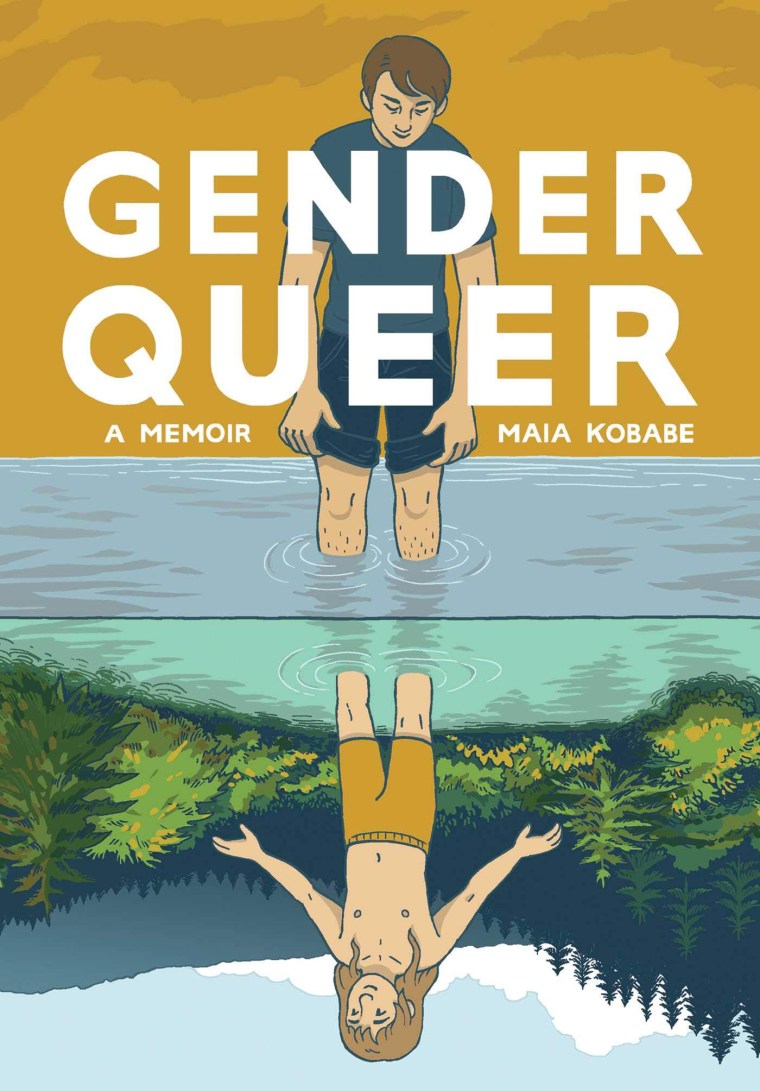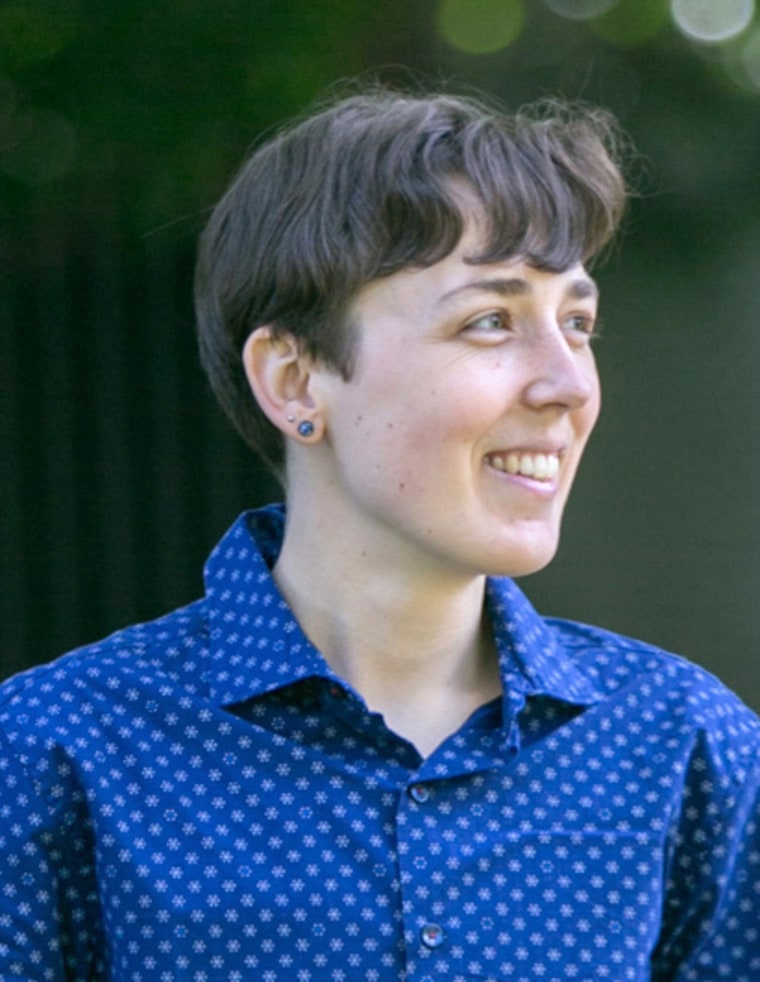On a late night in September, nonbinary author Maia Kobabe was tagged in a viral video of a school board meeting in Fairfax County, Virginia. The clip showed a parent shouting at a panel of board members while holding Kobabe’s award-winning book, “Gender Queer: A Memoir.”
Telling Kobabe’s story from adolescence to adulthood, the 2019 fully illustrated book is a de facto guide on gender identity that grapples with the hardships of coming out, the confusion of adolescent crushes and the trauma of being nonbinary in a society that largely sees gender as limited to two categories: man and woman.

But for its handful of graphic illustrations of LGBTQ sexual experiences — out of the book’s hundreds of drawings — the parent, Stacy Langton, passionately argued that it should be removed from school shelves.
“Pornography is offensive to all people. It is offensive to common decency,” Langton, who has two sons attending a high school within Fairfax County Public Schools, protested.
That night, Kobabe watched the video on mute, thought little of it and went to sleep.
“At that moment, I definitely thought, ‘This is just going to be a one-off incident,’ you know? ‘This is just one school district; this is just one parent,’” Kobabe told NBC News.
The next morning, Kobabe — who uses gender-neutral pronouns e, em and eir — woke up to a slew of emails from journalists at The Associated Press and local Washington, D.C., news stations requesting interviews.

After the contentious school board meeting, Fairfax County Public Schools, Virginia’s largest school district, pulled “Gender Queer” and another book, “Lawn Boy” by Jonathan Evison, from school shelves.
But that was just the beginning.
Books about race, sexual orientation and gender identity have historically been challenged in schools, but over the last several months, public and school libraries have seen a surge of opposition.
Deborah Caldwell-Stone, director of the American Library Association Office for Intellectual Freedom, previously told NBC News that while reported challenges against books with LGBTQ- and race-related content have traditionally been “constant,” this year, the association has seen a “chilling” uptick.
The books that have been challenged in recent months include classics, such as Toni Morrison’s “The Bluest Eye,” and modern works, including George M. Johnson’s “All Boys Aren’t Blue,” a young adult memoir detailing the trials of being a Black queer boy.
But above them all, Kobabe’s “Gender Queer” has turned into a rallying cry from parents, school officials and lawmakers in at least 11 states — from solidly red Texas to reliably blue New Jersey.
The month after being removed from Fairfax County Public Schools, the book was banned in Brevard Public Schools, a district in Florida. A group of parents in New Jersey challenged the book and several others around the same time, calling them “perverse.” And just last week, Wake County Public Libraries in North Carolina pulled it, saying its illustrations “do not align” with its book selection policy.
Texas Gov. Greg Abbott and South Carolina Gov. Henry McMaster, both Republicans, piled onto the outrage last month, demanding investigations into how “obscene” and “pornographic” books ended up on school shelves.
Many of the book’s challengers point to a single illustration depicting 14-year-old Kobabe fantasizing about an older man touching the penis of a seemingly younger man or boy. The drawing is based on an ancient Greek pottery cup that contains an erotic sketching of “a courting scene” and is on display at a museum in Oxford, England.
Langton, who has made several appearances on Fox News to discuss the book since speaking at the September school board meeting, said that while she does not have a problem with LGBTQ-affirming books being available to students, the image — and a handful of others depicting masturbation and oral sex — should not be available to high schoolers.
“It’s inexcusable, and it’s indefensible,” she told NBC News. “What part does pedophilia play in any person who is of a nonconforming gender identity? Why did Maia Kobabe think that was necessary to include in the book?”
Kobabe acknowledged that several of the book’s graphic images may not be appropriate for elementary school children. However, the author said the book’s frank accounts are “integral” to showing readers an experience growing up outside of cisgender and heterosexual norms, adding that “we need to reduce the shame” about sex among teenagers.
“It’s very hard to hear people say ‘This book is not appropriate to young people’ when it’s like, I was a young person for whom this book would have been not only appropriate, but so, so necessary,” Kobabe said. “There are a lot of people who are questioning their gender, questioning their sexuality and having a real hard time finding honest accounts of somebody else on the same journey. There are people for whom this is vital and for whom this could maybe even be lifesaving.”
Medical experts and advocates have long warned about the disproportionate rates of mental health issues and suicide among LGBTQ people. But recent research conducted by The Trevor Project, an LGBTQ youth suicide prevention and crisis intervention organization, has shown that increased acceptance and affirmation can significantly reduce risk.
Kobabe said despite the challenges, the majority of reader feedback has centered around how they see themselves and their own stories in the book.
“I’ve been receiving almost weekly, and sometimes more than weekly, emails from readers thanking me for writing it, telling me how much it meant to them, saying it helped them understand themselves or that they gave it to a parent or a child or a friend or a partner, and that it helped their loved one understand them more, and that it opened up conversations they had not previously been able to have,” Kobabe said.
Last year, the American Library Association agreed, awarding “Gender Queer” its Alex Award. The annual award recognizes 10 books that were originally written for adults but could have “special appeal” for teenagers.
In response to the recent surge of book challenges, a group of more than 600 writers (including Kobabe and bestselling children’s author Judy Blume), publishers, bookstore owners and advocacy groups signed a joint statement this month condemning trend, arguing it “threatens the education of America’s children.”
“This has been a strange time, but in many ways I don’t think it’s about my book,” Kobabe said. “I think it’s more about the social media moment that we’re in and the divisiveness of political opinions in this country right now.”
After reviewing the book’s content over two months, Fairfax County Public Schools reinstated “Gender Queer” to school shelves, citing a “commitment to supporting diversity in literature.”
To authors, specifically queer authors and authors of color, who are worried about their work being challenged, Kobabe said, “Don’t let this make you afraid.”
“I know it is a scary moment and the attacks definitely can be very intimidating, but I think it’s so important to stand by your truth and tell your story honestly and write what you need to write, what you feel called to write,” Kobabe said. “Please don’t let the threat of censorship silence your voice before you’ve even spoken.”
